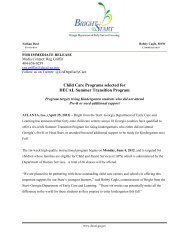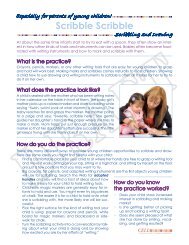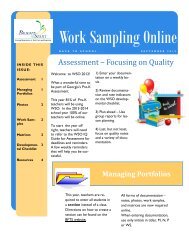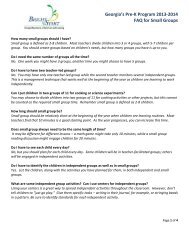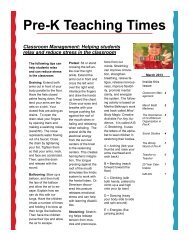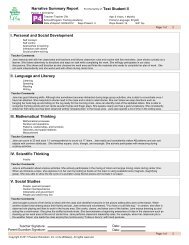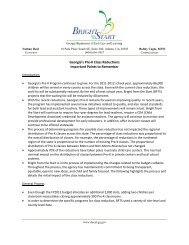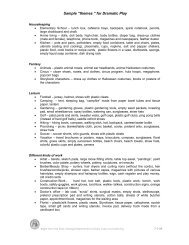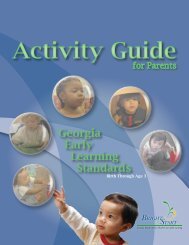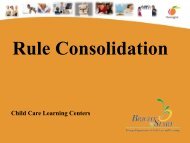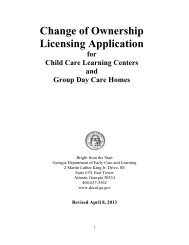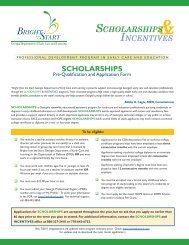Georgia's Pre-K Program - FPG Child Development Institute ...
Georgia's Pre-K Program - FPG Child Development Institute ...
Georgia's Pre-K Program - FPG Child Development Institute ...
Create successful ePaper yourself
Turn your PDF publications into a flip-book with our unique Google optimized e-Paper software.
18 Georgia Study of Early Care and Education: Findings from Georgia’s <strong>Pre</strong>-K <strong>Program</strong><br />
Assistant Teachers<br />
All Georgia’s <strong>Pre</strong>-K classes had at least one assistant teacher. c A few classes had more<br />
than one assistant teacher (2% of center-based classes, and 7% of school-based classes).<br />
• Education: In centers, 23% of Georgia’s <strong>Pre</strong>-K assistant teachers had an Associate’s<br />
degree or higher. In schools, 43% percent of pre-k assistant teachers had an<br />
Associate’s degree or higher (see Figure 9).<br />
• Major: In Georgia’s <strong>Pre</strong>-K classes in both centers and schools, less than 20% of<br />
teacher assistants majored in early childhood education (see Table 10).<br />
• Experience: Assistant teachers in center-based Georgia’s <strong>Pre</strong>-K classrooms reported<br />
a mean of 8 years of experience working in child care (median = 5, range = 1 to 36),<br />
and assistant teachers in school-based Georgia’s <strong>Pre</strong>-K classes reported a mean of 11<br />
years of experience (median = 9, range = 1 to 39).<br />
• Professional <strong>Development</strong> Hours: Assistant teachers in Georgia’s <strong>Pre</strong>-K classrooms<br />
in centers reported participating in a mean of 32 hours of in-service training in the<br />
past year (median = 16, range = 0 to 360), and those in school-based Georgia’s <strong>Pre</strong>-K<br />
reported a mean of 43 hours (median = 25, range = 6 to 431).<br />
• Professional <strong>Development</strong> Content: The most common in-service training topic<br />
reported among assistant teachers in Georgia’s <strong>Pre</strong>-K classes in both centers and<br />
schools was classroom management/discipline. Table 11 shows the percentage of<br />
Georgia’s <strong>Pre</strong>-K assistant teachers who participated in professional development<br />
about various topics during the past year.<br />
Figure 9. Education Level of Assistant <strong>Pre</strong>-K Teachers<br />
Percentage of Assistant Teachers<br />
100<br />
80<br />
60<br />
40<br />
20<br />
0<br />
17%<br />
Associate’s<br />
6%<br />
Bachelor’s<br />
53%<br />
Some<br />
college 31%<br />
Some<br />
college<br />
23%<br />
High<br />
school<br />
2%<br />
Some high<br />
school<br />
Centers Schools<br />
<strong>Pre</strong>-K Setting<br />
13%<br />
Bachelor’s<br />
28%<br />
Associate’s<br />
25%<br />
High<br />
school<br />
2%<br />
Master’s+<br />
c. For purposes of this report, we defined ‘assistant teacher’ as any paid adult other than the<br />
lead teacher who was present in the classroom on the day that the observers visited. In cases<br />
where there was more than one assistant in a classroom, the education, major, experience, and<br />
professional development activities of the assistant who reported spending the most hours in<br />
the past week in that class is reported.




